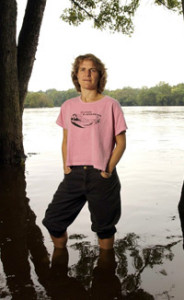By Maya van Rossum, Delaware Riverkeeper
Dear Future Generations,
You are 25 years in the future. Please tell me what my beloved Delaware River is like today. I am hopeful that the work that is keeping me up at nights today in 2015 has resulted in a cleaner and healthier River for you.
 My name is Maya van Rossum, I am the Delaware Riverkeeper. For nearly 20 years, it has been my responsibility, and my privilege, to be the voice of the Delaware River. My organization, the Delaware Riverkeeper Network, champions the rights of our communities to a Delaware River and tributary streams that are free-flowing, clean, healthy and abundant with a diversity of life.
My name is Maya van Rossum, I am the Delaware Riverkeeper. For nearly 20 years, it has been my responsibility, and my privilege, to be the voice of the Delaware River. My organization, the Delaware Riverkeeper Network, champions the rights of our communities to a Delaware River and tributary streams that are free-flowing, clean, healthy and abundant with a diversity of life.
In 2015, rivers do not have legal rights in the United State, but I am hoping that by 2040 that has changed. Other countries in our time have already given the environment rights, including the right to stand up for itself in a court of law and be heard.
Why is legal standing important? In 2015, the Delaware Riverkeeper Network is opposing shale gas development and all the harms it brings to our communities. Shale gas development has been called by some the environmental issue of our time. Legal standing is important because the need for legal action has grown as our region has been targeted by the energy industry.
The Delaware River cannot defend itself in court, but as the Delaware Riverkeeper, I have made sure we are there to stand for it under the law. On its behalf, the Delaware Riverkeeper Network has increasingly used environmental laws and the courts to protect the public trust that belongs to us all, not only to protect it from shale gas extraction, but also from the expansion of pipelines and power lines crossing our watershed, from proposals to process and store shale gas in our communities, and from proposals for liquefied natural gas (LNG) facilities that would facilitate shipping to international markets.
But by your time, the shale gas boom will have gone bust. I hope the sustainable energy future we are working for today has finally arrived. I hope our efforts in our time helped turn our nation from dirty fossil fuels while there was still time to impact climate change and sea level rise along our shores.
In addition to the legal rights for our rivers, I hope we have secured constitutional protection of environmental rights in states across the nation, and perhaps even in our federal constitution.
In March 2012, I, as the Delaware Riverkeeper, the Delaware Riverkeeper Network, along with seven municipalities and Dr. Mehernosh Khan, filed legal action challenging Act 13, which was signed into law by Governor Corbett on February 14, 2012. Act 13 amended the Pennsylvania Oil and Gas Act, and among other things, preempted municipal zoning of oil and gas development. We challenged the law on the grounds it violated the Pennsylvania Constitution and endangered our River, public health, natural resources, communities and the environment. On December 19, 2013, the Pennsylvania Supreme Court issued a final decision declaring portions of Act 13 unconstitutional, giving the Environmental Rights Amendment of the Pennsylvania Constitution strong substantive importance, and remanding portions of the law for additional litigation.
In addition to reinforcing that municipalities can validly zone oil and gas operations like any other industrial use, the decision Robinson Township, Delaware Riverkeeper Network, et al. v. Commonwealth affirmed the inherent and indefeasible rights of Pennsylvanians to pure water, clean air, and a healthy environment, and that by virtue of a constitutional provision in Pennsylvania’s constitution, this right must be firmly protected by every government official at every level of government in Pennsylvania.
Since securing that decision, I and the Delaware Riverkeeper Network have worked hard to advance the concept of constitutional environmental rights in the hopes that one day every state in the U.S. will have a strong environmental rights amendment in their constitution, one that rivals the strength of what has been achieved in Pennsylvania. I hope that day, and those rights, have been achieved by 2040. If they have been achieved, know they were hard won. Please don’t ever take them for granted.
So now, 2040, tell me about my River. Is it healthy? Is it still free-flowing? Do all its waters support all life stages for fish populations? Has our unique population of Atlantic sturgeon rebounded from near extirpation? Do we once again have a vital horseshoe crab population in the Bay? Do red knots once again fill the skies over the Delaware during spring migrations? Has the watershed protection approach, in which beneficiaries of clean and healthy water supplies bear a primary responsibility for its protection, taken hold throughout our region?
If these things have not come to pass, come find me. If there is still work to be done, I can guarantee you I am still out there, speaking for the River because a river can’t defend itself.
Remember the River always,
Maya K. van Rossum
The Delaware Riverkeeper
Editor’s Note: Dear 2040 is a series of blog posts containing some of the letters included in our 50th anniversary time capsule, buried in October 2015. Throughout the rest of 2015 we’ll be posting some of those letters, sharing what our leaders, thinkers, artists, and Schuylkill Center staff are thinking about the year 2040. You can read all the posts here.

Bravo, thank you, Maya. Let’s continue to hope that all people will choose to support life into the future, as all life is dependent on the health and vitality of the waters of our one and only shared planet earth. We are so lucky to have a chance to live, breath, move, and embrace all the gifts freely bestowed by our natural world. May we no longer waste our chance at life on suffering and death for our rivers, waterways, and oceans. With the health of our local, national, and global waterways, life will continue to flourish into a future worth treasuring. Water is the key to life. Thank you, Maya, for all you have done, and continue to do for the treasure before our very eyes – the ancient and glorious Delaware River.